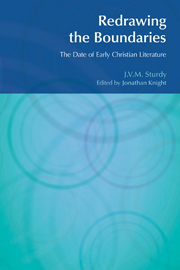Book contents
- Frontmatter
- Contents
- Preface
- Abbreviations
- 1 The Problem Posed
- 2 1 Clement
- 3 The Letters of Ignatius
- 4 Polycarp
- 5 Early Christian Literature: Some Parameters of Date
- 6 The Relationship of the Synoptic Gospels
- 7 Mark
- 8 Luke
- 9 Matthew
- 10 Acts
- 11 The Pauline Corpus: Its Growth and Development
- 12 The Catholic Epistles
- 13 Johannine Literature
- 14 Summary and Conclusions
- Appendix
- Notes
- Bibliography
- Index of Names
- Index of References
Preface
- Frontmatter
- Contents
- Preface
- Abbreviations
- 1 The Problem Posed
- 2 1 Clement
- 3 The Letters of Ignatius
- 4 Polycarp
- 5 Early Christian Literature: Some Parameters of Date
- 6 The Relationship of the Synoptic Gospels
- 7 Mark
- 8 Luke
- 9 Matthew
- 10 Acts
- 11 The Pauline Corpus: Its Growth and Development
- 12 The Catholic Epistles
- 13 Johannine Literature
- 14 Summary and Conclusions
- Appendix
- Notes
- Bibliography
- Index of Names
- Index of References
Summary
The untimely death of John Sturdy in summer 1996 robbed the scholarly world of its opportunity to engage with a scholar who for most of his career swam against the tide. In 1976 John Robinson produced his Redating the New Testament in which he argued for a first-century date for the New Testament documents. Sturdy was more than once heard to observe on this book, “This is simply mischief!” Sturdy himself dates the New Testament (and the sub-apostolic) documents considerably later than Robinson – many of them in the second century CE. This is the distinctive feature of his book, and why (although I do not always agree with his conclusions) I feel it should be made the subject of careful consideration in today's scholarly climate. Dissenters are not always made welcome; but that is why the guild of New Testament scholarship needs them all the more.
Sturdy and Robinson disagreed throughout their, both sadly truncated, lives. Sturdy made available to Robinson an early version of his material on Clement, Ignatius and Polycarp. This is mentioned by Robinson on pp. 334-35 of his Redating, with generous disagreement. Sturdy himself reviewed Robinson's book in 1979; a copy of that review is printed as an Appendix to this volume.
Sturdy left an incomplete and, in places, a rather patchy manuscript. Jill Sturdy asked me, after his death, if I would prepare it for publication in such a way that would be faithful to the mindset and pen of the author himself.
- Type
- Chapter
- Information
- Redrawing the BoundariesThe Date of Early Christian Literature, pp. vii - xPublisher: Acumen PublishingPrint publication year: 2008



